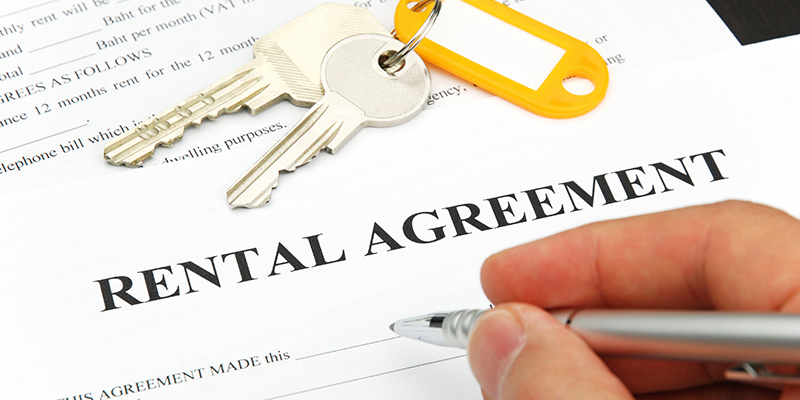A tenant lease agreement is just as important to a landlord as it is to a homeowners association. Without one, a number of legal complications can arise.
What Is a Tenant Lease Agreement?
A lease agreement is a contract that legally binds a landlord and a tenant. It serves as proof of the relationship between the landlord and the tenant as well as outlines the terms of their agreement. This contract typically includes rent payment terms, the duration of the rental, the obligations of the landlord and the tenant, and any other special provisions.
It is easy to see how a lease agreement involves the landlord and the tenant. But, where does a homeowners association factor into the equation?
Homeowners who live in HOA-run communities automatically become members of the association. Therefore, they must follow the rules of the HOA, including paying regular dues.
But, the residents of an HOA community are not always owners or members. In some associations, owners are permitted to rent out their homes or units to tenants. In this case, the tenant may technically be a resident of the community, but, strictly speaking, they are not part of the association.
Depending on the HOA’s rules, a tenant may have some of the same rights as the owner of the property but not others. For instance, tenants may be able to use common areas and keep pets but not vote or attend board meetings.
Why a Written Tenant Lease Agreement Is Essential to an HOA
 To landlords and tenants, the purpose of a lease agreement is obvious. It thoroughly explains the terms, rules, and procedures for living in a rental home or unit. It also makes the responsibilities of both parties clear.
To landlords and tenants, the purpose of a lease agreement is obvious. It thoroughly explains the terms, rules, and procedures for living in a rental home or unit. It also makes the responsibilities of both parties clear.
But, what about the association? Why is a written lease agreement between a landlord (owner/member) and their tenant important to the HOA?
First of all, a lease agreement clearly identifies the parties of the contract, i.e. who is the landlord and who is the tenant. This removes any ambiguity when it comes to who becomes liable for what.
Second of all, a lease agreement also protects the HOA in case the owner defaults on their dues and assessments. Depending on state laws and an association’s governing documents, the HOA may be able to garnish a tenant’s rent should the owner stop fulfilling this obligation.
Without a lease agreement, the HOA would have no legal claim on the tenant’s rent. This is because the absence of an agreement may shift how courts see the relationship between the supposed landlord and the supposed tenant. With no contract, the tenant would not be a tenant at all but simply a resident.
This is exactly what happened in a fairly recent Washington case, where the court ruled that one homeowners association could not go after a resident for the owner’s outstanding dues. Due to the lack of an agreement and the “tenant” not paying rent, they were not considered a tenant at all.
What Your HOA Board Should Do
If your homeowners association currently has rules in place regarding rentals, then you probably already have a set procedure that owners must follow when they want to rent out their home or unit. Many HOAs, for instance, require owners to submit an application form consisting of the details of the rental, including the tenant’s contact information and screening details.
Having such measures is a good place to start. But, your HOA board should also implement the following:
1. Require a Tenant Lease Agreement
Given how vital a lease agreement is, your board should make it a requirement for owners to have a signed one with their tenant. In some cases, if state laws and governing documents allow, your board may have the ability to approve what’s written on the lease. This way, you can ensure a lease that benefits the association.
2. Become a Party to the Lease
Another rule you should consider is to require owners to make the HOA a party to the lease. While this may seem like an odd requirement, it does have a purpose.
Essentially, this ensures that both the owner and the tenant:
- Accept that the community has restrictions;
- Are bound by these restrictions;
- Have read and understood these restrictions; and,
- Should the owner or tenant disobey these restrictions, the HOA possesses the right to evict the tenant.
3. Include an Assignment of Rents Provision
Should a lease owner fail to pay dues, the association should have protective measures in place. Many associations have an assignment of rents provision written within their governing documents. This way, the HOA can garnish a tenant’s rent or require a tenant to pay their rent to the association instead in order to satisfy the owner’s debt.
There are several states that allow such a provision, such as California and Florida. The tenant also does not have to worry because the owner can’t use this as justification to evict the tenant. Of course, owners always have the option to ask tenants to prepay their year’s rent as a loophole.
4. Ask for a Copy of the Tenant Lease Agreement
It is common for associations to come up with a rule that requires owners to provide the HOA with a copy of their lease agreement. This way, you can have documented proof of the agreement and what it includes. This also allows you to verify whether the lease owner has written the required provisions into the contract.
Can an HOA Approve and Disapprove Tenants?
 This is a tricky question because it involves fair housing laws. You may be tempted to require owners to gain approval for their tenants, but such a requirement can invite discrimination claims.
This is a tricky question because it involves fair housing laws. You may be tempted to require owners to gain approval for their tenants, but such a requirement can invite discrimination claims.
If a potential tenant feels they were rejected due to discrimination, they can file a lawsuit against your HOA. Though, there are circumstances that allow you to reject tenants, such as when it is based on objective factors like if the tenant has a history of violence or felony.
Get the Protection Your HOA Needs
The lack of a tenant lease agreement can spell disastrous legal consequences for your homeowners association. Thus, it is imperative to require owners to have one with their tenants. In doing so, you can protect your association from liability, ensure all parties agree to the HOA’s restrictions, and have the ability to go after the tenant’s rent should the owner default on their dues.
Of course, implementing these rules is not always easy, especially without professional help. For that, you need an HOA management company like Clark Simson Miller. Call us today at 865.315.7505 or contact us online to request a free proposal.
RELATED ARTICLES:
- Why Is HOA Rule Compliance Absolutely Necessary In A Community?
- What Is An HOA Demand Payoff Letter?
- Is Running an HOA Home Business Allowed?

